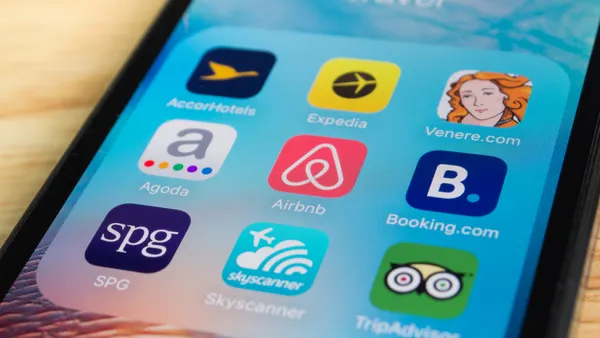Dive Brief:
- The travel sector faces a “substantial paradigm shift” in the coming decade, driven by the rise of younger travelers, sustainability and AI, according to Deloitte’s “Future of Travel and Tourism” report, published Wednesday.
- In addition to forecasting demographic changes and more emphasis on sustainability, the report predicts the emergence of generative AI agents that will book trips for travelers, optimizing for pricing, loyalty memberships, cancellation policies and any additional conditions and perks.
- Hotel brands are already preparing for the impact of these trends on the industry’s future by integrating AI into their operational processes — such as virtual concierges — and working toward sustainability initiatives that accelerate more environmentally friendly practices industry-wide.
Dive Insight:
As boomers age out of travel, Deloitte projects that younger generations will account for nearly 90% of trips by 2030, with Gen Z and millennials accounting for more than half of U.S. leisure trips in summer 2030, up from about a third in summer 2023. This means that the hotel industry will have to meet the demands of these tech-savvy, less loyal and conspicuously conscious consumers in order to grow.
Deloitte notes that unlike older travelers, millennials and Gen Z are less motivated by loyalty program memberships, and have embraced travel platforms and products — like online travel agencies and short-term rentals — that aren’t centered around loyalty programs.
Looking ahead, the next wave of travel loyalty programs will need to consider strategies that allow travelers to quickly earn smaller rewards, partnerships that connect to consumer behavior beyond travel and programs that leverage data to offer personalized perks and offers, according to Deloitte.
As for tech, Deloitte predicts that over the next several years generative AI will become increasingly integrated into travel search and booking platforms, spawning a new entity: the GenAI agent. It will book trips for travelers via the best channel, optimizing for pricing, loyalty memberships, cancellation policies and any additional conditions and perks.
Plus, as the Gen Z and millennial share of travel spend grows, so should the emphasis on sustainable travel. According to Deloitte, one-third of American travelers said they would take some kind of action to travel more sustainably — such as prioritizing hotels with higher sustainability ratings — during their 2023 holiday travels, with even higher figures for millennials (38%) and Gen Z (42%).
This means that providers who lean into sustainability in an authentic way will better be able to earn the trust of younger generations.
Some hotel brands are already making major investments in an effort to attract younger consumers. For example, hospitality group SBE and Wyndham Hotels & Resorts have partnered to launch a lifestyle brand that will target millennial and Gen Z travelers who are “priced out of the lifestyle hotel market.” And Margaritaville Hotels & Resorts recently debuted its RV resort brand, Camp Margaritaville, a “big draw for millennials,” according to the company’s president of development.
Hotels are also already integrating AI into a variety of functions, with properties using the tech to identify bed bugs on mattresses, program virtual concierges and track kitchen waste.











